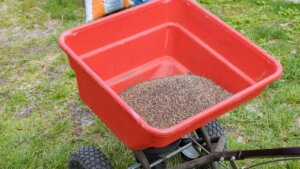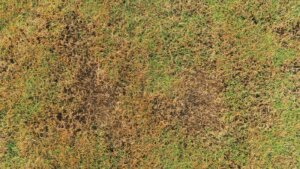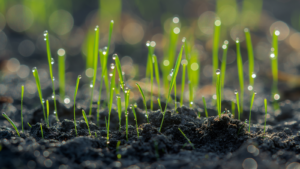Fertilizing your garden is like giving your plants a multivitamin. It provides them with the nutrients they need to grow strong and healthy. But just like vitamins, there’s a right and a wrong way to apply fertilizer. Let’s dig into the correct methods to ensure your vegetable garden and lawn thrive.
Using Fertilizer: The Basics
Before you start sprinkling or pouring, take a moment to understand the essentials of fertilizer. According to the University of Massachusetts Amherst’s Greenhouse Floriculture program, it’s not just about giving your plants a quick boost; it’s about sustaining their growth and health over time, which begins with proper storage and handling to ensure the effectiveness of the fertilizer. Fertilizer is a substance that adds nutrients to your garden soil, helping plants grow better. It often contains vital elements like nitrogen, phosphorus, and potassium—collectively known as N-P-K.
Why Plants Need Fertilizer
In the life of a garden, the role of fertilizer cannot be overstated. It’s the cornerstone of a thriving ecosystem, providing sustenance where the soil alone is insufficient. But why exactly is fertilizer so crucial? Let’s delve into the reasons that make it an indispensable ally for any gardener:
- Nutrient Replenishment: Plants, much like any living organism, require a balanced diet. Fertilizers act as a meal for your garden, restoring essential nutrients and ensuring your soil isn’t left nutrient-poor, especially in sandy soils where nutrients can easily leach away. The Minnesota Department of Agriculture emphasizes the importance of responsible application to prevent runoff into our water systems.
- Healthy Growth: Applying the right fertilizer encourages stronger roots, lusher leaves, and vibrant blooms.
Read the Label
Every fertilizer bag carries a label detailing the N-P-K ratio, indicating the levels of each primary nutrient. For instance, a bag marked with “10-10-10” contains an equal balance of nitrogen, phosphorus, and potassium. This ratio is crucial for gardeners to understand as it determines how much of each nutrient the fertilizer will deliver to the soil and, subsequently, to your plants.
Apply Fertilizer the Correct Way
Applying fertilizer correctly is essential for the health of your garden. Here’s how to do it:
For Your Lawn
- Granular Fertilizers: Use a spreader to evenly distribute granular fertilizer across your lawn. Apply 1 pound per 100 square feet of garden area to avoid over-fertilization.
- Liquid Fertilizers: If you’re using liquid fertilizer, apply it with a sprayer or watering can, making sure to cover the entire lawn evenly.
For Your Vegetable Garden
- Granular Application: Carefully work the granular fertilizer into the soil or side-dress along the rows, to provide a steady supply of nutrients to your growing plants.
- Liquid Application: For a quick nutrient boost, apply liquid fertilizer directly to the base of your plants, ensuring that the roots can easily absorb the much-needed nutrients.
Applying fertilizer correctly is essential for the health of your garden. The Brazos River Authority suggests using a spreader to evenly distribute granular fertilizer across your lawn, applying one pound per 100 square feet of garden area to avoid over-fertilization. For liquid fertilizers, they recommend using a sprayer or watering can, ensuring even coverage across the entire lawn.
Feed Your Plants for Healthy Growth
Nurturing your garden is more than just a pastime; it’s a commitment to the well-being of your plants. Feeding them the right fertilizer is akin to choosing the best diet for optimal health. It’s not just about fertilizing; it’s about providing a balanced meal that caters to the unique needs of your garden’s flora.
When to Fertilize
Timing is everything when it comes to fertilization. Begin in early spring, as plants wake from their winter dormancy, to jump-start their growth. As the growing season unfolds, continue to feed your plants every three to four weeks. This consistent nourishment supports a cycle of robust growth, ensuring that your garden remains a lush, inviting space.
- Early Spring: A spring application of fertilizer lays the groundwork for a season of growth. It’s the perfect time to apply granular or water-soluble fertilizers, giving your plants the initial boost they need.
- Growing Season: As the weeks progress, keep an eye on your garden. Many plants benefit from extra food as they bloom and produce fruit. This is where foliar applications or a gentle side-dress of compost can do wonders.
How Much to Use
The question of ‘how much’ is crucial. Over-fertilizing can lead to fertilizer burn while under-fertilizing might leave your plants wanting. A general guideline is to use 2 to 3 pounds of a balanced fertilizer per 100 square feet of garden area. But remember, this is a starting point. Always refer to the instructions on the bag and consider the individual needs of your plants.
- General Guideline: Whether you’re using manure, organic, or inorganic fertilizers, starting with the right amount is critical to avoiding the leaching of excess nutrients into the soil.
- Follow Instructions: Each type of fertilizer comes with its own set of guidelines. For instance, lawn fertilizers might require a different application rate than those formulated for perennial plants or vegetable rows.
Plants Thrive with the Right Nutrients
Selecting the right fertilizer for your garden plants ensures they get the nutrients they need to thrive.
Nutrient-Specific Needs
Selecting the right fertilizer is like choosing the best food for your family. It’s about understanding and meeting the specific nutritional needs of your plants.
- Nitrogen: For lush, green growth, nitrogen is essential.
- Phosphorus: To support strong root development and flowering, phosphorus is key.
- Potassium: For overall plant health and disease resistance, potassium is necessary.
Soil Testing
Test Your Soil
Before fertilizing, conduct a soil test to understand which nutrients are lacking.
Tailor Your Approach
Use the results to select a fertilizer that addresses your garden’s specific needs:
- For Lush Lawns: Use a drop spreader to apply lawn fertilizers evenly, and never apply before rain to prevent runoff.
- For Blooming Gardens: Apply granular fertilizer around the base of the plants and use irrigation to help it dissolve and reach the roots.
- For Robust Trees and Shrubs: Fertilizing trees and shrubs typically requires one application every growing season, with a focus on the ground around the base, avoiding the leaves to prevent burn.
By feeding your plants the proper nutrients in the correct amounts and at the optimal times, you’re setting the stage for a garden that’s not just surviving but thriving. With the right approach, your garden will be a testament to the care and attention you’ve invested, full of healthy plants that give back vibrant flowers and bountiful fruit throughout the season.
Discover the Terra Difference: Your Premier Garden Partner
Ready to see your garden in its full glory? With Terra Lawn Care Specialists, you’re not just choosing a service; you’re selecting a dedicated partner committed to bringing out the best in your landscape. Our expert team, equipped with the right knowledge, tools, and a deep understanding of the Montgomery, Berks, Bucks, Delaware, and Chester Counties’ unique soil and climate conditions, stands ready to tailor a fertilization plan that ensures your garden’s vibrancy throughout the seasons.
Why settle for a one-size-fits-all solution when you can have a customized care plan designed by local specialists who know your area inside out? Terra Lawn Care is synonymous with excellence, offering:
- Local Expertise: Deeply familiar with the local soil, climate, and plant varieties.
- Customized Care: Tailored fertilization strategies that meet your garden’s specific needs.
- Sustainable Practices: Eco-friendly options that nourish your garden and protect the environment.
- Professional Precision: State-of-the-art tools and techniques that guarantee optimal nutrient application.
Don’t let your garden settle for anything less than the professional touch it deserves. Connect with Terra Lawn Care Specialists today, and together, let’s cultivate a garden that’s not only beautiful but sustainably thriving. Visit our Contact Us page now to start a conversation that will lead your garden down a path of lush, vibrant growth. Your dream landscape awaits!



